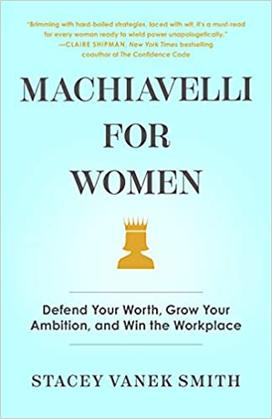Stacey Vanek Smith ’99 Is Teaching Machiavelli to Working Women
Pay inequity made Smith think ‘more about Machiavelli and how to navigate things that feel unfair’
Stacey Vanek Smith ’99 tells it like it is. As co-host of NPR’s “The Indicator from Planet Money,” she gives listeners straight shots of business and economic reporting. And in her new book, she gives women in the workplace advice straight from that most brutally no-nonsense 16th-century philosopher: Niccolò Machiavelli.

“I think people are a little alarmed when they see the title. They assume I’m advocating being underhanded and dishonest at work, which I don’t do,” she says.
Smith grew up in Boise, Idaho. Her weekends were spent mucking out irrigation ditches, cleaning sheds, and removing wasps’ nests at her parents’ cattle ranch in the “super tiny” hamlet of Ola. She said some colleagues have expressed incredulity that someone with such a clean-cut upbringing could write this book. “My co-workers were joking with me, and one of them was, like, ‘Are you even really from Idaho?’” she says.
She first encountered the philosopher’s classic treatise The Prince when she was a junior in a political theory class taught by Maurizio Viroli, professor emeritus of politics. “I hated Machiavelli. I really hated him,” she recalls. “In the other texts, even The Communist Manifesto, there was something so optimistic and beautiful about the way the authors looked at people and their beautiful innate nature. But Machiavelli was really cynical. It didn’t seem interesting to me at all.”
Her opinion began to change shortly after she earned her masters in journalism at Columbia. At lunch with two other new hires who had similar backgrounds, she discovered to her dismay that one colleague, a white man, made far more than she did, and the third colleague, a woman of color, had a salary somewhat less than hers.
“That kind of thing happens again and again. It does make you think less about Cicero and the noble soul of man and more about Machiavelli and how to navigate things that feel unfair,” says Smith, who spent the first 11 years of her career with “Marketplace” on NPR an experience so intense, she describes it as “Navy SEAL radio training.”
She urges readers to see the Florentine diplomat as an “incredibly clear-eyed, original thinker who might just be history’s first true champion of real talk.” His top piece of advice that applies to women? See the reality of a situation. Remove all sorts of morality and emotion from it, and take in the truth of it, according to Smith. Next, consider your options and look for ways forward as though you were playing chess.
When negotiating for a raise, women should do their homework. “It is not a wise plan to risk all one’s Fortune and not all one’s forces,” she advises, quoting Machiavelli. Whereas men may succeed in getting a pay boost by bragging about their accomplishments, Smith advises women to “lay out a collaborative future together” and reinforce that vision with well-researched facts about accomplishments.
She offers another piece of negotiating advice for women, one that comes from her 18-year radio career: use silence.
“Silence is a magical and powerful tool. Silence makes people deeply uncomfortable,” she says. “It’s a useful technique in an interview — and in a negotiation — to let a couple of beats go by, and people, if you give them a second, will sometimes open up in the most amazing ways.”










No responses yet